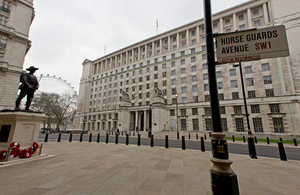I would like to start by thanking all the organisations involved in organising and taking part in this year’s Anti-Bullying Week. I know it has been quite challenging to arrange this year – in what has been a very difficult time due to COVID-19.
We know bullying can have a devastating effect on children and their families, and we must make sure that we do not let up in our efforts to tackle it, especially at this particularly difficult time in children’s lives.
This year’s theme is ‘United Against Bullying’ and I am so proud to be supporting it. It feels particularly important right now as it gives us an opportunity to bring together children and young people to focus on this important issue, and to shine a light on the positive things that we can all do to help put a stop to it.
As many of you will know, the Department for Education has been a proud partner of the Diana Award since 2011, and we have been providing funding for the Anti-Bullying Ambassadors Programme since 2016. This funding has been used to train and support thousands of children and young people to become ambassadors, and I am so pleased that the Diana Award will be continue to support schools when our grant programme ends next year.
I welcome the Demos independent evaluation of the Anti-Bullying Ambassadors programme, and I would also like to congratulate the Diana Award for empowering over 35,000 young people to make a real difference in their schools through the programme – what an achievement.
Anti-Bullying Ambassadors provide ongoing peer support to their cohort and go on to share best practice. This is incredibly important, as we know that many young people turn to their friends and peers first when they have a concern or issue.
Having said that, the Government is committed to supporting schools, and indeed all education settings, to prevent and tackle all forms of bullying. We want schools to be safe, calm places where pupils can thrive.
Bullying can also have a serious effect on mental health. Children who are exposed to bullying are likely to experience higher rates of anxiety, depression, and self-harm in adulthood.
In these unprecedented times, many pupils are returning to school having been exposed to a range of adversity and trauma including bereavement, anxiety and in some cases increased welfare and safeguarding risks. Some children, particularly vulnerable groups, will need additional support and access to services such as educational psychologists, social workers and counsellors.
To support these children, we have put in place a range of measures, including guidance for settings and an £8m training initiative for educational staff and Local Authority services to support children and young people’s mental health and wellbeing. This will help to make sure that schools are alert to underlying issues arising as a consequence of the pandemic, which might lead to behaviour issues and bullying.
The challenge has broadened over recent years with more and more use of online activities such as social media and gaming. Spending time online can be very beneficial for children, particularly at the moment where it can provide the opportunity to connect with friends and family. But we recognise the worry about online safety.
The evidence does suggest that a lot of online child bullying is an extension of the bullying that happens between pupils at school. But online bullying follows children back home, is difficult to escape from, and the bully can also hide behind the anonymity of online platforms. Worryingly, online bullying can rapidly amplify, escalate, and go viral. This brings extra pressure to the victims. I want to make it clear that all forms of bullying, including cyberbullying, for whatever reason, is unacceptable.
I am also concerned by the use of deeply offensive language on certain online platforms. While some social media platforms let the user regulate content such as with profanity filters, others do not. Therefore, vile language that would never be printed or expressed in a traditional newspaper or media broadcasts, is allowed to run rife across Twitter.
I am concerned that this online activity normalises hate speech and normalises bullying. I want to send a clear message that deeply offensive language on social media is unacceptable, just as it is unacceptable face to face. It should never be tolerated or dismissed as banter.
To help in our efforts to combat cyberbullying and support children from all forms of online harm we have published specific guidance to help schools teach their pupils how to stay safe online. This guidance helps schools to ensure that children have the skills and knowledge they need to make the best use of the internet and technology in a safe, considered and respectful way.
Obviously, children’s online life extends far beyond what schools can control and influence. These efforts need to be backed up by a responsible approach from social media platforms, who must take responsibility for what happens on their watch, and especially when children use their services.
The Government remains committed to delivering legislation to tackle online harms, as set out in the online harms white paper. This will introduce a statutory duty of care on companies to take steps to protect their users, including children, from harm.
But I want to be clear that companies should not wait for legislation to act – they can make a real difference to the lives of children right now.
Protecting children from online harms is also part of wider government priorities. Research shows that around a quarter of children and young people have sent a nude image to someone they are interested in; and almost half have received a nude image of someone else, sent by that same person. The potential risks of creating or sharing these types of images are significant – and it may lead to embarrassment, bullying or indeed vulnerability (for example blackmail) if shared further.
That is why we are working with the UK Council for Internet Safety’s Education Working Group, in consultation with the National Police Chief’s Council, to update guidance for education settings working with children and young people on sharing nudes and semi-nudes.
We also work with other experts such as the National Crime Agency, Internet Matters, the Internet Watch Foundation and the NSPCC to help make sure children are safe online, whether in the classroom or learning from home.
I know that tackling bullying is a priority for many organisations both inside and outside government. I recently met with the All-Party Parliamentary Group on Bullying, who are supported by the Red Balloon Learner Group, to discuss our future plans for anti-bullying policy and the latest research and findings regarding bullying in schools.
So let me finish off by thanking everyone – young and old – across the country who is working to be united against bullying. I look forward to hearing more about this week’s events and working with you all to help tackle bullying. Together, we can stop bullying for good. Thank you.

